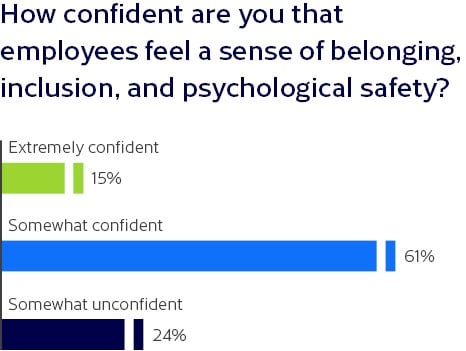
Understanding and Preventing Quid Pro Quo Harassment in the Workplace
Harassment Prevention


Many organizations report making progress in their diversity, equity and inclusion (DEI) efforts over the past year. However, a lot of work remains to achieve a workplace culture where all employees feel included as valued members of the team.

Many organizations report making progress in their diversity, equity and inclusion (DEI) efforts over the past year. However, a lot of work remains to achieve a workplace culture where all employees feel included as valued members of the team.
Traliant’s recent report, How to Build an Effective DEI Program, found that 70% of surveyed DEI leaders believe their level of DEI maturity level is equal to or ahead of other organizations in their industry going into 2022. However, a quarter of respondents were not confident that employees feel a sense of belonging, inclusion and psychological safety.

A sense of belonging — the perception of being accepted within a given group — is an important measure of an organization’s DEI maturity level and a key indicator of inclusion. A sense of belonging is created when employees trust it is psychologically safe to be their authentic selves at work and feel appreciated for their contributions. When employees feel they belong to a team, they bond with colleagues in ways that foster better engagement and collaboration.
If your DEI initiatives aren’t creating a sense of belonging, it can be a sign to rethink and revise the organization’s DEI strategy and goals. For example, 30% of DEI leaders admit they haven’t trained their organization on how to identify and address unconscious bias and microaggressions, which can undermine efforts to foster psychological safety and a sense of belonging.
Unconscious bias is the tendency to make snap judgments — good or bad — about certain people or groups that are based on stereotypes. Microaggressions, which often stem from unconscious bias, are everyday slights, snubs or insults that convey hostile or negative messages to individuals who are part of underrepresented or marginalized groups.
Raising employees’ and managers’ awareness and understanding of what it means to foster acceptance and a sense of belonging in everyday actions is an important step along an organization’s evolving DEI journey.
Click here to read our entire report: “How to Build an Effective DEI Program.”
A recent survey of DEI executives identifies the need to build a sense of belonging in the workplace when setting DEI goals and measuring progress. To achieve a strong sense of belonging, organizations should ensure their DEI strategy includes training and other initiatives that help foster an inclusive work culture where employees feel safe to authentically express themselves.
Sign up for a free trial of our Diversity, Equity and Inclusion training.